Sapelo Island – History & Traditions
Sapelo Island is a barrier island. This land mass is a member of a chain of islands that extends from South Carolina to Northern Florida. Sapelo is accessible by ferry in Darien, GA. Sapelo plays a significant role in the history of enslaved people and their descendants, the Gullah-Geechee people. In this video, viewers will learn about the traditions and gifts of Sapelo residents and how these talents have been passed along for hundreds of years and can be traced to their West African ancestors.
Critical Reflection Questions & Activities
Pre Video Questions |
Nobis Big Ideas |
| What are your family traditions? Why are they important? |
History |
| What is homesickness? Have you ever experienced homesickness? | History |
Post Video Questions |
Nobis Big Ideas |
| What do you imagine it is like to learn the traditional skills of: basket weaving or making and throwing a cast net? |
History Relationships Cultural Responsiveness |
| What does this video remind you of? [Learning a skill set from a parent or relative.] | History Relationships Global Citizenship |
| How does this narrative shift the story about enslaved people? | History Power Global Citizenship |
| What new information did you receive about this period of American history? | History Power Global Citizenship |
| What are the collective histories? And what content in the video support or question the narrative being told? [How traditions are important. How the method of sharing traditions is maintained.] | History Power Global Citizenship |
| What historical events or relationships contribute to this narrative? | History Power Relationships |
| Is there reciprocity within relationships? And what is our shared fate and social responsibility in the relationships/communities in which we are civically engaging? [When there is active engagement in sharing a skill set or tradition it keeps the history and narrative of communities prominent.] | Power Relationships |
| What aspects of Power or Privilege are displayed in this video? | Power |
| What cultural aspects are on display or reinforced in this situation? | Cultural Responsiveness |
| What dominant narratives did the film contradict? | History Power |
| How does this story address inclusivity? | Power Relationships |
| How have communities or people with less control challenged oppression? [Keeping traditions alive: basket weaving, making and throwing a casting net. Forbidden to play drums.] | History |
| How can you be empowered or empower others to discover the historical narratives in your community? How can you have honest and courageous conversations with community members? | Power Global Citizenship Cultural Responsiveness |
|
How are traditions connected to identity and what narratives are supported in this module in regards to:
|
History Power Relationships Cultural Responsiveness |
| Why is it significant that Sapelo descendants are Africans from the “rice coast”? What gifts and skills did they bring to the colonies? | History Power Global Citizenship |
| Imagine what it felt like to be separated from your family and your home. What are some experiences of stolen Africans? | History Power Relationships Global Citizenship |
| What is it important to keep traditions going? For Gullah/Geechee why is basket weaving an important part of that tradition? What traditions were they forced to abandon? |
History |
| How do traditions connect individuals to their heritage/ancestors? | History Power Relationships Global Citizenship |
Additional Resources

